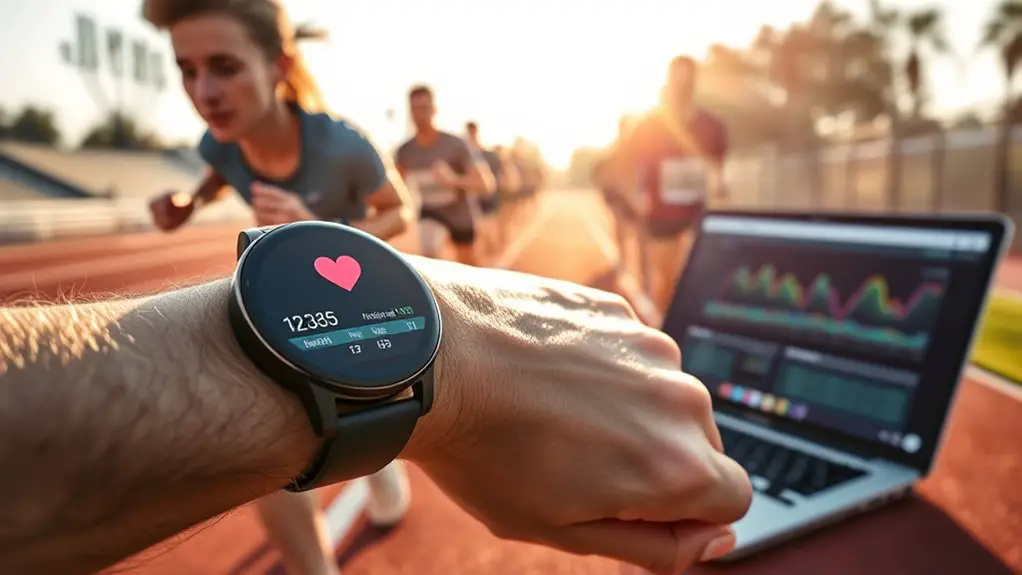Biometric tracking improves your training by giving you real-time insights into your heart rate, sleep quality, and activity levels. These insights help you make informed decisions for personalized workouts and recovery strategies. You can adjust your training intensity based on your body's signals and craft tailored recovery plans to avoid burnout. This technology empowers you to achieve your fitness goals more effectively. You'll discover even more ways to enhance your training journey as you explore further.
Understanding Biometric Tracking Technologies
As you explore the world of biometric tracking technologies, it's important to recognize how these innovations can enhance your training experience. Biometric tracking isn't just about numbers; it's about understanding your body's unique signals. With devices that monitor heart rate, sleep patterns, and activity levels, you'll gain insights into your performance that standard methods can't provide.
Imagine training without the guesswork—knowing when to push harder or when to take a break. These technologies empower you to make informed choices, allowing for a more personalized training routine. You'll not only maximize your results but also enjoy the journey toward your fitness goals. Additionally, real-time heart rate monitoring ensures that you can adjust your workout intensity effectively, promoting smarter training decisions.
Key Metrics Monitored by Biometric Devices
When you use biometric devices, you'll notice they track several key metrics that can enhance your training. Heart rate variability, sleep quality, and activity levels are just a few indicators that help you understand your body's performance. Monitoring these metrics can give you valuable insights into your overall health and training effectiveness. Additionally, tracking sleep quality can significantly impact your recovery and performance by facilitating muscle repair and enhancing cognitive function.
Heart Rate Variability
Heart rate variability (HRV) is a crucial metric that biometric devices monitor to assess your body's stress and recovery levels. By tracking HRV, you can gain insights into how well your body is managing stress and adapting to training demands. A higher HRV often indicates a more resilient and balanced state, while a lower HRV can signal fatigue or stress accumulation. This information empowers you to make informed decisions about your training regimen, allowing for adjustments that promote peak performance. With biometric devices at your side, you can listen to your body's signals, ensuring you're not just training hard, but training smart. Embracing HRV monitoring can lead to greater freedom in your training journey, helping you reach your fitness goals effectively.
Sleep Quality Analysis
Monitoring your heart rate variability can provide valuable insights into your recovery, but understanding your sleep quality is just as important for optimizing performance. Quality sleep fuels your freedom to train harder and recover faster. Biometric devices track key metrics, helping you pinpoint areas for improvement.
| Metric | Importance | Ideal Range |
|---|---|---|
| Sleep Duration | Total hours slept | 7-9 hours |
| Sleep Efficiency | Time spent asleep vs. in bed | ≥ 85% |
| REM Sleep Percentage | Cognitive and physical recovery | 20-25% of total sleep |
| Deep Sleep Duration | Restorative sleep phases | 1.5-2 hours |
With these insights, you can make adjustments to your routine, ensuring you wake up ready to conquer the day with energy and focus.
Activity Level Tracking
While you're pushing your limits in training, keeping track of your activity level is essential for understanding your overall performance. Biometric devices monitor key metrics like steps taken, calories burned, and active minutes, giving you a clear picture of your daily exertion. By analyzing this data, you can identify patterns and adjust your routines to maximize your potential. You'll discover what works best for you, whether that means ramping up intensity or incorporating rest days. Plus, seeing your progress in real-time can be incredibly motivating, helping you stay focused on your goals. With activity level tracking, you're not just training; you're gaining the freedom to tailor your approach, ensuring every moment spent is an investment in your personal growth.
Personalizing Training Programs With Data Insights
As you explore the world of biometric tracking, you'll discover how data insights can revolutionize your training programs. By leveraging these insights, you can personalize your workouts and release your true potential. Imagine having the power to:
- Adjust intensity based on real-time heart rate data, ensuring you're always in the ideal zone.
- Tailor recovery times based on your body's response, so you never overtrain or under-recover.
- Identify patterns in your performance, allowing you to set achievable goals that keep you motivated.
- Monitor fatigue levels, helping you avoid burnout and maintain your passion for training.
With these insights, you're not just following a generic plan—you're crafting a unique journey that aligns with your personal goals. This freedom to customize your training enables you to break barriers and truly enjoy the process. Additionally, by utilizing wearable technology, you can gain deeper insights into your biomechanics, further enhancing your training effectiveness. Embrace the data, and transform your training experience!
Enhancing Recovery Strategies Through Biometric Feedback
When it comes to recovery, biometric feedback can be a game-changer for you. By monitoring sleep patterns and adjusting your nutrition intake, you can develop a personalized recovery plan that truly meets your needs. This tailored approach not only enhances your recovery but also optimizes your overall performance. Incorporating proper nutrition strategies into your recovery plan can further accelerate muscle healing and growth.
Personalized Recovery Plans
By harnessing biometric feedback, athletes can craft personalized recovery plans that cater specifically to their individual needs. This approach not only maximizes recovery but also fosters a sense of freedom in your training journey. Here's how you can enhance your recovery strategies:
- Tailored Nutrition: Fuel your body with nutrients that align with your recovery state.
- Dynamic Stretching Routines: Incorporate movements that release tension and promote flexibility.
- Hydration Strategies: Monitor fluid intake to guarantee ideal rehydration post-exercise.
- Mindfulness Practices: Engage in meditation or breathing exercises to reduce stress and enhance mental clarity.
With biometric insights, you're empowered to make choices that reflect your unique recovery needs, allowing you to thrive in both training and life.
Monitoring Sleep Patterns
Recovery isn't just about nutrition and hydration; sleep plays an essential role in how well your body bounces back. Monitoring your sleep patterns through biometric tracking can reveal insights that help you optimize recovery. It's not just about the hours you log; it's about the quality of that sleep.
| Sleep Quality | Hours Slept | Recovery Score |
|---|---|---|
| Excellent | 7-9 hours | 95% |
| Good | 6-7 hours | 80% |
| Average | 5-6 hours | 65% |
| Poor | 4-5 hours | 50% |
| Very Poor | <4 hours | 30% |
Adjusting Nutrition Intake
While monitoring sleep patterns is essential, adjusting your nutrition intake can greatly enhance your recovery strategies. Biometric feedback helps you fine-tune what you eat, allowing you to fuel your freedom and performance. Here are four key adjustments to contemplate:
- Hydration: Stay hydrated to improve muscle function and recovery.
- Protein: Incorporate lean proteins to repair muscles and reduce soreness.
- Carbohydrates: Choose complex carbs for sustained energy and to replenish glycogen stores.
- Vitamins and Minerals: Add colorful fruits and veggies for antioxidants that combat inflammation.
Real-Time Monitoring for Optimal Performance
As you engage in training, real-time monitoring can be a game-changer for optimizing your performance. With instant feedback on your body's metrics, you can adapt your approach on the fly. This freedom allows you to push your limits while avoiding overexertion.
Here's a quick look at how real-time monitoring can enhance your training:
| Metric | Benefit | Your Action |
|---|---|---|
| Heart Rate | Maintains intensity | Adjust pace accordingly |
| Body Temperature | Prevents overheating | Hydrate or slow down |
| Oxygen Levels | Guarantees proper recovery | Modify breathing techniques |
Embracing these insights, you'll discover the potential to elevate your training sessions. Ultimately, real-time monitoring empowers you to train smarter, not just harder, helping you achieve a sense of freedom in your fitness journey. Staying aware of your fluid needs ensures that you maintain optimal hydration levels, further enhancing your performance.
Setting and Achieving Goals With Precision
Setting clear goals is essential for any successful training program, since they provide direction and motivation. With biometric tracking, you can achieve those goals with precision and freedom. Here's how to set your sights on success:
Setting clear goals is vital for training success, offering direction and motivation while biometric tracking enhances precision and freedom in achieving them.
- Define Your Vision: Picture your ultimate fitness achievement—whether it's running a marathon or mastering a new skill.
- Break It Down: Divide that big vision into smaller, achievable milestones that keep you energized along the way.
- Track Progress: Use biometric data to monitor your performance, ensuring you stay on target and adjust as needed.
- Celebrate Wins: Acknowledge every achievement, big or small. This fuels your passion and reinforces your commitment.
Additionally, using goal setting techniques helps create a clear roadmap to success. With these steps, you'll not only see progress but also feel empowered to reach new heights in your training journey. Embrace the freedom that comes with precise goal-setting!
The Future of Biometric Tracking in Sports and Fitness
With advancements in technology transforming the landscape of sports and fitness, the future of biometric tracking holds exciting possibilities. Imagine having real-time data at your fingertips, allowing you to tailor workouts and recovery plans like never before. Wearable devices will become even more sophisticated, tracking everything from heart rate variability to oxygen levels, giving you freedom to optimize your performance.
As artificial intelligence integrates with biometric data, you'll receive personalized insights that adapt to your body's needs. This means you can push your limits safely while minimizing the risk of injury. Envision collaborating with your coach through shared data, creating a dynamic training environment that empowers you to reach your goals. Additionally, leveraging real-time analytics will enhance your understanding of your performance metrics and enable you to make informed decisions during your training sessions.
With the blend of technology and individualized training, you're not just a participant; you're an architect of your fitness journey. The future is bright, and it's all about giving you the tools to thrive in your pursuit of freedom and excellence.
Frequently Asked Questions
What Types of Biometric Devices Are Available for Consumers?
You've got a treasure trove of biometric devices at your fingertips! Fitness trackers, smartwatches, heart rate monitors, and sleep trackers can all help you stay in tune with your body and achieve your personal goals.
How Accurate Are Biometric Tracking Devices in Measuring Performance?
Biometric tracking devices vary in accuracy, but many provide reliable performance metrics. You'll find that most devices can track heart rate, calories burned, and activity levels effectively, helping you gauge your progress on your fitness journey.
Can Biometric Data Be Shared With Coaches or Trainers?
You know what they say, "Knowledge is power." Yes, biometric data can be shared with coaches or trainers, allowing them to tailor your training program, enhance performance, and help you reach your goals more effectively.
Are There Privacy Concerns Related to Biometric Tracking?
Absolutely, there're significant privacy concerns with biometric tracking. You might worry about data misuse or unauthorized access, making it essential to understand how your information's stored and shared to maintain your freedom and security.
How Can Beginners Effectively Use Biometric Data in Training?
To effectively use biometric data in training, you should start by setting clear goals, monitoring your progress regularly, and adjusting your routines based on insights. Trust your instincts, and don't hesitate to experiment for best results.




